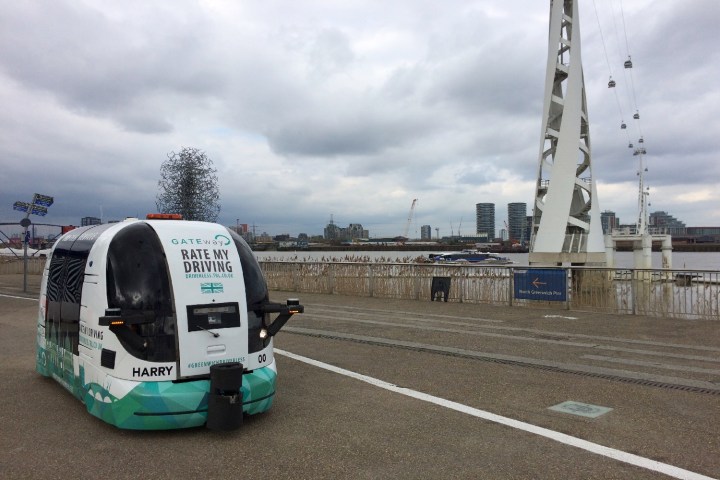
A trial of autonomous public transport is currently taking place in London’s Greenwich Peninsula, with seven prototype shuttles — each designed to carry four passengers — ferrying select members of the public as part of the city’s GATEway (Greenwich Automated Transport Environment) research project.
“What we’ve introduced are our driverless pods, going up and down the Greenwich Peninsula,” Dr. Graeme Smith, CEO of Oxbotica, the company which developed the vehicles, told Digital Trends. “An early version of these pods has been in operation at Heathrow Airport for two or three years. They’re totally driverless, but at Heathrow they run on a special modified railway track. What we’ve done for the GATEway Project is to add sensors and a lot of clever AI software that lets them run in lots of different places, such as regular cycle paths or roads.”
Along with the technological research aspect of the test, part of the trial is to show how driverless vehicles might work as zero emission, low noise transport for residents; maybe even one day as an alternative for cars or buses.
“We’ve got a list of about 5,000 people who have signed up to experience the pods,” Smith continued. “We’re letting them have a test ride, and before we’ve done that we ask them about their preconceptions about driverless cars. Then after they’ve had some real-world experience, we ask them again and see if their views have changed.”
The pods are described as the world’s first fully automated shuttle vehicles, although for the trial a trained staff member is on hand at all times to stop them if necessary. The trial will run for the next three weeks.
Similar to other self-driving car projects, the pods use technologies like cameras and lasers to locate themselves on a map, perceive and track dynamic obstacles around them, and plan a safe trajectory to their destination. Over an eight-hour period of operation, one vehicle alone collects four terabytes of data — which is roughly equivalent to 2,000 hours of film, or 1.2 million photographs.
Other driverless vehicle tests will take place in the U.K. later this year.
Editors' Recommendations
- GM to cut funding for beleaguered driverless startup Cruise, report claims
- Dubai Police to deploy driverless patrol cars with AI smarts
- Cruise’s robotaxis have driven 1 million miles fully driverless
- Million-dollar driverless racing challenge coming to Indianapolis
- Apple reportedly aiming to build electric car for 2024 launch


